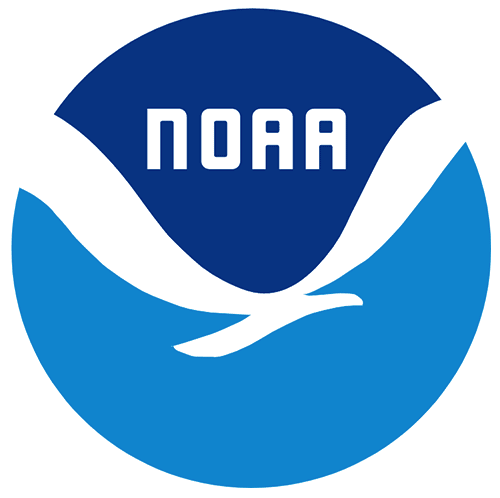2009 USACE NCMP Topobathy Lidar: Isle Royale, MI
Welcome Guest ( Sign In )
NOAA
 These files contain topographic and bathymetric lidar data collected by the Compact Hydrographic Airborne Rapid Total Survey (CHARTS) system along the
coastline of the island of Isle Royale, Michigan in Lake Superior. CHARTS integrates topographic and bathymetric lidar sensors, a digital camera and
a hyperspectral scanner on a single remote sensing platform for use in coastal mapping and charting activities. Data coverage generally extends along
the coastline from the waterline inland 500 meters (topography) and offshore 1,000 meters or to laser extinction (bathymetry). The topographic lidar
sensor has a pulse repetition rate of 9 kHz at 1064 nm (near-infrared wavelength). The bathymetric lidar sensor has a pulse repetition rate of 1 kHz
at 532 nm (green wavelength).
Native lidar data is not generally in a format accessible to most Geographical Information Systems (GIS). Specialized in-house and commercial software
packages are used to process the native lidar data into 3-dimensional positions that can be imported into GIS software for visualization and further
analysis. Horizontal positions, provided in decimal degrees of latitude and longitude, are referenced to the North American Datum of 1983 (NAD83).
Vertical positions were referenced to the NAD83 ellipsoid and provided in meters. The National Geodetic Survey's (NGS) GEOID03 model was used to transform
the vertical positions from ellipsoid to orthometric heights referenced to the North American Vertical Datum of 1988 (NAVD88). The positions are relative
to NAD83 in decimal degrees of longitude and latitude. The heights were converted from ellipsoid to orthometric heights (NAVD88) using the Geoid03 model
with the results in meters. Once converted to geoid heights, the data were then converted to IGLD85 using the VDatum program from NOAA (National Oceanic
and Atmospheric Administration). The NOAA Office for Coastal Management received the data and converted the hydro files from IGLD85 heights to NAVD88 heights using
VDatum. The heights were then converted to ellipsoid heights using Geoid03. The topo files were converted from NAVD88 heights to ellipsoid heights
using Geoid03. These files were converted for data storage and Digital Coast provisioning purposes.
In addition to these lidar point data, the bare earth Digital Elevation Models (DEM) created from the lidar point data are also available. These data are available for custom download at the link provided in the URL section of this metadata record.
This data set is an LAZ (compressed LAS) format file containing LIDAR point cloud data.
These files contain topographic and bathymetric lidar data collected by the Compact Hydrographic Airborne Rapid Total Survey (CHARTS) system along the
coastline of the island of Isle Royale, Michigan in Lake Superior. CHARTS integrates topographic and bathymetric lidar sensors, a digital camera and
a hyperspectral scanner on a single remote sensing platform for use in coastal mapping and charting activities. Data coverage generally extends along
the coastline from the waterline inland 500 meters (topography) and offshore 1,000 meters or to laser extinction (bathymetry). The topographic lidar
sensor has a pulse repetition rate of 9 kHz at 1064 nm (near-infrared wavelength). The bathymetric lidar sensor has a pulse repetition rate of 1 kHz
at 532 nm (green wavelength).
Native lidar data is not generally in a format accessible to most Geographical Information Systems (GIS). Specialized in-house and commercial software
packages are used to process the native lidar data into 3-dimensional positions that can be imported into GIS software for visualization and further
analysis. Horizontal positions, provided in decimal degrees of latitude and longitude, are referenced to the North American Datum of 1983 (NAD83).
Vertical positions were referenced to the NAD83 ellipsoid and provided in meters. The National Geodetic Survey's (NGS) GEOID03 model was used to transform
the vertical positions from ellipsoid to orthometric heights referenced to the North American Vertical Datum of 1988 (NAVD88). The positions are relative
to NAD83 in decimal degrees of longitude and latitude. The heights were converted from ellipsoid to orthometric heights (NAVD88) using the Geoid03 model
with the results in meters. Once converted to geoid heights, the data were then converted to IGLD85 using the VDatum program from NOAA (National Oceanic
and Atmospheric Administration). The NOAA Office for Coastal Management received the data and converted the hydro files from IGLD85 heights to NAVD88 heights using
VDatum. The heights were then converted to ellipsoid heights using Geoid03. The topo files were converted from NAVD88 heights to ellipsoid heights
using Geoid03. These files were converted for data storage and Digital Coast provisioning purposes.
In addition to these lidar point data, the bare earth Digital Elevation Models (DEM) created from the lidar point data are also available. These data are available for custom download at the link provided in the URL section of this metadata record.
This data set is an LAZ (compressed LAS) format file containing LIDAR point cloud data.
